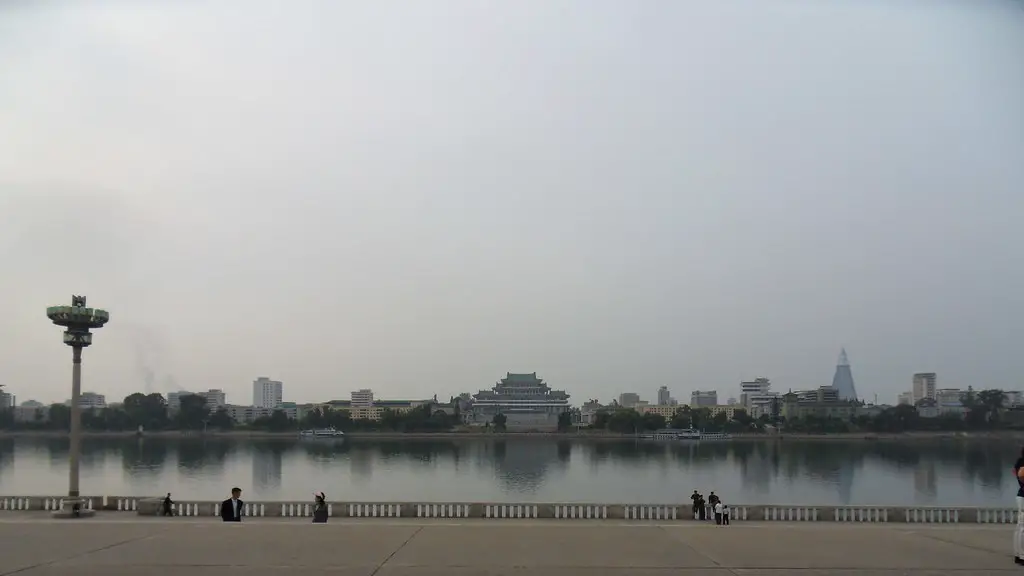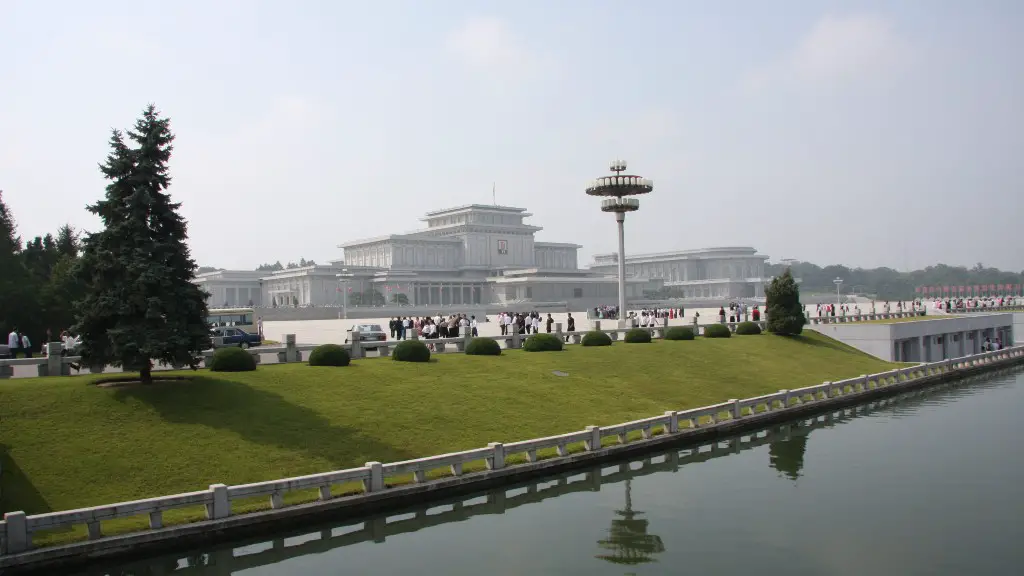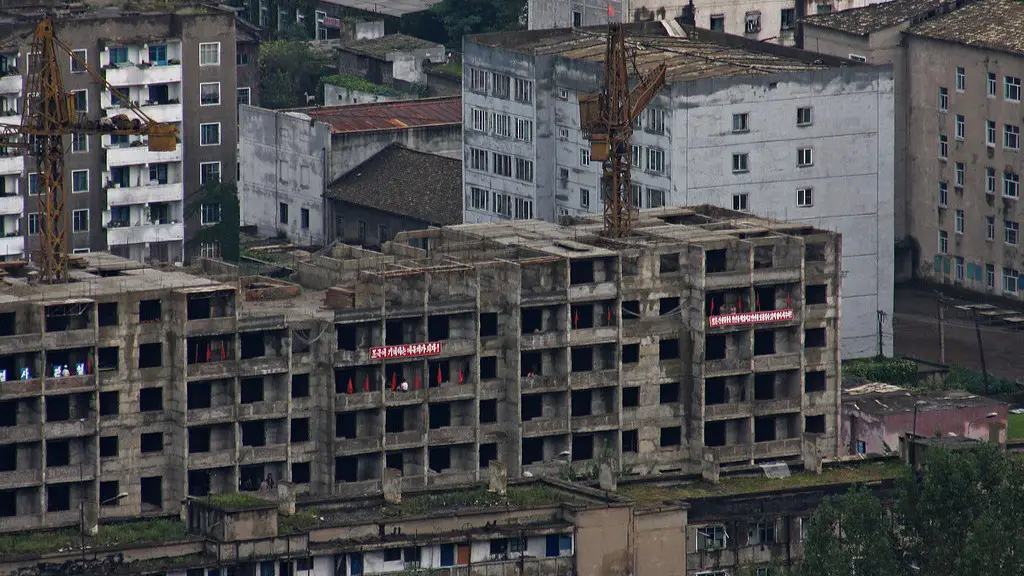Effects of a North Korean Attack
The effect of a North Korean attack on its target countries would undoubtedly be catastrophic. The Korean peninsula is the most militarized border in the world and this makes the region particularly vulnerable to a conflict with the nation. North Korea has a large and sophisticated arsenal of weapons, including nuclear, chemical, biological and ballistic missiles that could be used to strike its neighbors. South Korea, Japan, and the United States would be the primary targets of a North Korean attack as they are the most likely countries to respond to Pyongyang’s provocations.
The potential damage of an attack by North Korea would depend largely on the weapon used and the target. A nuclear or nuclear-capable ballistic missile strike on a densely populated area would be devastating, with thousands of casualties and massive destruction. Even a conventional attack could have disastrous consequences, as North Korea has an estimated 700,000 troops, 6,000 tanks and thousands of artillery pieces that could be deployed quickly.
An attack would also have a significant economic impact as it would cause economic disruption, including slower tourism and investment in the region, a drop in regional trade and investment, and higher energy (oil and gas) prices. In addition, regional stability would be undermined and there could be a surge in immigration from North Korea as people flee the country.
Moreover, a North Korean attack could bring geopolitical consequences as other countries, such as China, would be wary of coming to the defense of North Korea and would be less willing to support the United States and its allies in tough negotiations. This could have ramifications for global security, as any erosion of the US’s strategic alliances in Asia could embolden nations like China and Russia to pursue their own interests in the region without fear of reprisal.
It is also important to consider the human cost of a North Korean attack. Any civilian casualties would be heartbreaking and could lead to a humanitarian crisis. In addition, there could be long-term psychological trauma amongst those who survived, as well as displacement of people living in the targeted areas.
International Response
In the event of a North Korean attack, it is likely that the international community would rapidly respond. The United Nations Security Council could impose economic sanctions on North Korea in an effort to prevent further provocations. The US or its allies could also consider military action in order to contain or eliminate the threat. However, any military action would be complicated by the fact that North Korea’s nuclear capability and missile technology are difficult to pinpoint, which means that any response would have to be carefully targeted in order to avoid further escalation.
At the same time, diplomatic channels could be used to seek a resolution to the crisis. China and Russia are historically North Korea’s major international allies and so their diplomatic efforts could be crucial in achieving any negotiated settlement. Meanwhile, the US and South Korea would need to continue working together to maintain their defenses against a potential strike.
It is also important to consider the need for international humanitarian aid in the wake of an attack. If North Korea were to launch a nuclear strike, for example, the United Nations would need to be prepared to provide aid to any affected countries. This aid could include medical assistance, food and shelter for those who are displaced, and psychological support for those who have been impacted by the attack.
Overall, the international community would need to take swift and decisive action to protect those affected by a North Korean attack and to ensure that North Korea does not pose a further threat to peace and security.
US Response
In the event of a North Korean attack, the US would need to take swift and decisive action. The US has a strong strategic alliance with South Korea and so would have an obligation to respond to any North Korean aggression. This response could include sanctions, diplomatic pressure, or a military strike. However, US President Donald Trump has said that he is open to diplomacy and has even indicated his willingness to meet with North Korean dictator Kim Jong-un. This suggests that the US is more likely to take a diplomatic approach to resolving any crisis, rather than take military action.
Nonetheless, if the US does decide to take military action, it is likely to involve coordination with South Korean forces. The South Korean military is well-equipped and prepared for a conflict and has a clear understanding of the North Korean threat. Therefore, the US could rely on the South Korean military’s expertise to respond efficiently to a North Korean attack.
The US could also consider deploying its own troops to the Korean peninsula. US forces are capable of responding quickly to any potential North Korean aggression and could provide vital support to the South Korean military. However, this option is likely to be a last resort, as any US military presence in the region could have serious implications.
Overall, the US would need to consider all of its options carefully before deciding on the best course of action. In any case, the US would likely prioritize finding a diplomatic solution to the crisis, while simultaneously preparing for a potential military engagement.
Military Implications
Military action would be a last resort in the event of a North Korean attack. Any such action would need to be properly considered, as the consequences could be severe. A nuclear attack, for example, would have devastating implications for the region and the wider world and could trigger an even greater conflict.
A military response to a North Korean attack would need to be carefully planned to avoid exacerbating the situation. The US would need to determine the most effective way to target North Korean forces without endangering civilians and also consider how to protect its own forces, as North Korea is particularly adept at camouflage and tunneling and could use these tactics to ambush US troops.
The US would also need to anticipate the possible reactions of North Korea’s allies and consider strategies to mitigate the risk of further escalation. Countries like China and Russia have their own strategic interests in the region and could be swayed by North Korea’s rhetoric to oppose any action taken by the US.
Overall, a military response to a North Korean attack would be a risky endeavor and could result in significant losses. Therefore, the US would need to consider all of its options carefully before resorting to this option.
Regional Implications
In the event of a North Korean attack, the regional and global implications would be far-reaching. Countries in the region would be particularly affected as trade and investment could suddenly become less attractive and tourism could sharply decline. This could have a damaging effect on the economies of countries like South Korea and Japan, as well as their political relations.
Humanitarian and environmental damage could also be severe, depending on the type and target of a North Korean attack. Civilian casualties could be high and the region could be left with reduced agricultural and economic capacity. In addition, any nuclear attack would leave the region with long-term radiation damage, which would have an impact on the environment, as well as people’s health and lives.
Lastly, geopolitical tensions would be significantly heightened in the region. A North Korean attack would further complicate the already precarious security situation in the Korean peninsula and could potentially draw in other nearby nations into a conflict. This could lead to an unstable and unpredictable environment, with serious repercussions for the wider Asia-Pacific region.
Psychological Impact
The psychological impact of a North Korean attack would be immense. Any civilian casualties would be heartbreaking and could cause long-term trauma amongst those affected. People who had survived an attack could also be emotionally scarred, as they would have witnessed immense destruction and violence. Furthermore, those who are displaced by a North Korean attack would likely find it difficult to settle again in a new area, as they would have had to leave their homes and familiar surroundings.
It is also important to consider the psychological impact of a North Korean attack on those who were not directly involved. The sudden presence of war and violence in a peaceful region could lead to fear and confusion amongst the general public, as people would be uncertain about their safety and the safety of their loved ones. This fear could further be exacerbated by reports of casualties and destruction from the media, leading to a feeling of helplessness and despair.
Overall, the psychological implications of a North Korean attack would be immense and could have lasting consequences for those affected. It is therefore important for the international community to be prepared to provide psychological support for those who have been impacted by a North Korean attack.
Conclusion
The implications of a North Korean attack would be catastrophic. The effects of such an attack would depend largely on the weapon used and the target, but could range from massive destruction to severe economic disruption and heightened geopolitical tensions. It is likely that the US and its allies would consider several options to respond to a potential attack, including sanctions, diplomatic pressure and military action. However, any military action would be complicated by North Korea’s nuclear capability and missile technology and could have serious implications for the region and beyond. Lastly, it is important to consider the human and psychological cost of a North Korean attack, which could be devastating for those impacted.





